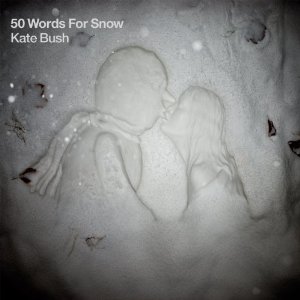Thanks to Wuthering Heights, Kate Bush will always be connected to Emily Brontë, the author of the novel whose story Bush retold in her debut single. Her tenth studio album, however, is driven by a preoccupation shared with Emily’s younger sister. At the beginning of Charlotte Brontë’s Jane Eyre, the eponymous heroine is found poring over Bewick’s History of British Birds, fantasising about the “forlorn regions of dreary space” around the fringes of the Arctic in which seabirds congregate. This “reservoir of frost and snow” fascinates the bleakly meditative Jane, and sets the reader up for a story in which a thaw is rarely apparent; similarly, 50 Words for Snow sees Bush devote herself entirely to the impressionistic evocation of winter scenes.
It’s perhaps surprising that she hasn’t been moved to embark on such a project earlier. Snow brings about a state of exception in which there’s no pressure to exert ourselves on the outside world: instead, it invites contemplativeness and the prioritisation of personal and domestic relationships over professional ones. Bush’s habitual provocations to abandon day-to-day concerns while cultivating romantic, internal landscapes have always felt slightly like the work of someone gazing from a window into a blizzard. This, one senses, is her natural territory.
That said, the fundamentals of climate don’t lend themselves readily to sonic distillation. There’s plenty one can say about snow, but capturing its essence in sound is considerably more challenging. Bush has clearly given this problem due consideration, and produced something which, if not an exact aural equivalent to its theme, clearly takes musical leads from the appropriate atmospheric behaviour. Where her past work has often been heavily-layered and breathless, 50 Words for Snow uses negative space to impressive effect; much of the album features little more than voice and flurrying passages of piano which gust across the stave, changing pace and melodic direction as if they’re suddenly hitting updrafts. By and large, even the diversions from this template don’t replicate the cramped arrangements of tracks like ‘The Sensual World’ or ‘Hounds of Love’, and Bush’s trademark massive-sounding percussion is generally absent here.
The album opens with ‘Snowflake’, an exercise in personification in which Bush adds a chorus to a spoken-word piece – told from the perspective of falling snow – delivered by her son Albert. A barely-varying piano figure is, with the exception of some unintrusive electronics, the only accompaniment to the vocals throughout the ten-minute track, and the outcome recalls the waning phrasing of Michael Nyman or Eno circa Music for Airports. Impressively, this is followed up by a piece which exceeds it in strangeness. On ‘Lake Tahoe’ birds caw, barely audibly, in the tundra left by the receding piano, a pair of choristers occasionally make aptly religious-sounding contributions, and Bush provides a meandering, striking vocal. The comparison might seem incongruous, but – with the arguable exception of PJ Harvey’s Let England Shake – there hasn’t been a pop record this intriguingly abstract since Scott Walker’s The Drift.
The acid test of a piece of work of this nature is probably whether or not it gets away with things which would be unforgivable elsewhere. When Bush leaves Lake Tahoe for ‘Misty’, one soon figures out that she’s singing about a romantic tryst with, yes, a snowman: in some hands this would be wretchedly cloying, but here it seems utterly convincing as it rolls along on a subtle tumult of percussion and bass (provided by Danny Thompson). Singing about the inevitable tragedy of seasonally-specific relationships isn’t the last of the risks taken here, either. ‘Snowed in at Wheeler Street’ sees Bush duet with none other than Elton John, the kind of move which diminishes expectations radically when announced in a press release. Extraordinarily, she somehow coaxes from Elton a performance which at least partially atones for all that Diana business: he enters the song with a – slightly chilling – ‘We’ve been in love forever’, before the two spin out an ambiguous tale of entanglement over a backing track that finally lets the world know what would have happened if Bowie had reworked the second side of Low as an Off-Broadway musical.
The tempo increases only twice throughout. ‘Wild Man’ does this without disrupting the overall texture of the album; the title track, in which Stephen Fry plays the role of an elderly lexicographer indulging Bush’s desire to hear fifty words for snow, represents more of a stylistic fracture. It isn’t a bad piece of music as such, but its insistent rhythm feels like an intruder from an earlier record: it’s just too busy in the context. Opinion will be divided on Fry’s contribution, but it’s a relief that, in its wake, sparse closer ‘Among Angels’ relocates the trajectory set by the earlier songs.
50 Words for Snow is undoubtedly whimsical, but it’s played and arranged so exquisitely that even the most po-faced should be able to acknowledge the scale of its achievement. One struggles to think of a record which calls to mind a particular climate as powerfully as this does and, indeed, such comparisons come across as counterintuitive: there’s the first Burial album, the great sonic depiction of British drizzle, and Plastikman’s undemonstratively excellent Consumed, an echo-heavy prairie panorama of ice and wind. Considering Bush – and, by association, Elton John – in the company of largely instrumental electronic musicians is perhaps itself a slightly whimsical thought experiment, but it does justice to the overwhelming oddness and sonic austerity of this work.


